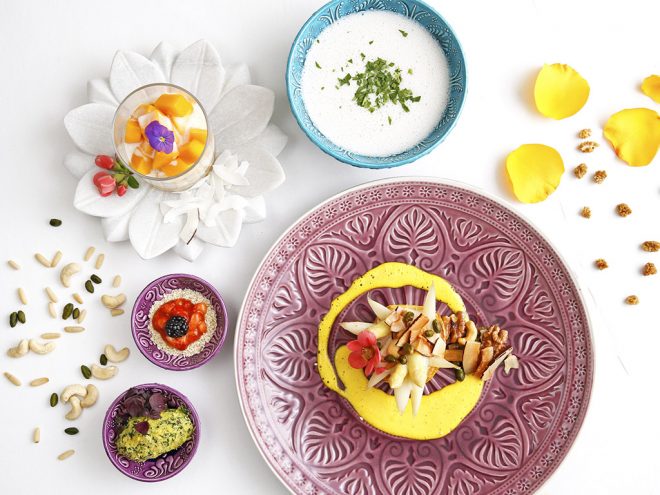Taste preferences have a genetic component, similar to the Dosha constitutions (an individual mix of the regulatory powers: Vata, Pitta and Kapha). The inborn array of tastes establishes a foundation that is extended into a lifelong learning process. Gandusha, the Ayurvedic morning mouth care, cleanses the mouth’s mucous membranes of residues and wastes, helping heighten the sense of taste.
Sweets
increases Kapha
decreases Vata and especially Pitta
increases life expectancy and vitality
clarifies the skin and sensory organs
regenerates body tissues
Important: The beneficial effect of the taste defined in Ayurveda as “sweet” does not apply to sugar or artificial sweeteners, but solely to the sweetness contained in natural foodstuffs.
Sour
increases Kapha and especially Pitta
decreases Vata
stimulates appetite and digestion
promotes resilience
strengthens sensory organs
Salty
increases Kapha and especially Pitta
decreases Vata
stimulates digestion
improves the elasticity of tissues
allows bodily fluids to flow
Spicy
increases Vata and Pitta
decreases Kapha
stimulates digestion
reduces Ama (metabolic wastes)
reduces fat, sweating and water accumulation in the tissues
acts as an antibacterial agent and purifies
Bitter
increases Vata
decreases Pitta and especially Kapha
reduces Ama
stimulates the appetite
firms the skin and muscles
dissipates surplus bodily tissue
acts as an antibacterial agent and purifies the blood
inhibits inflammatory processes
reduces fever
Astringent
increases Vata
decreases Pitta and Kapha
reduces bodily fluids
promotes healing processes, also after injuries
acts as an antibacterial agent
nourishes and calms


